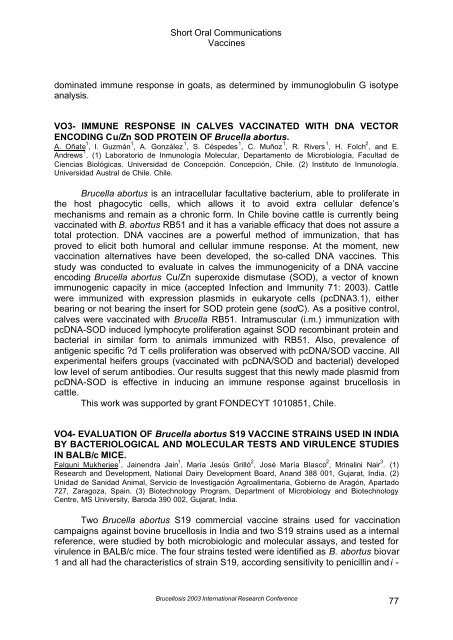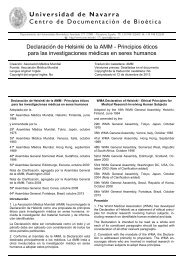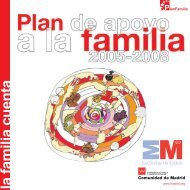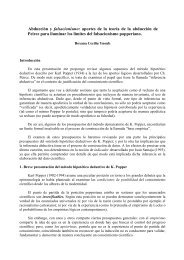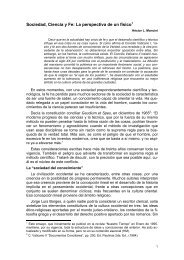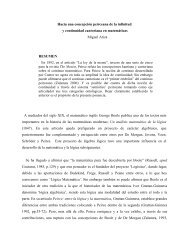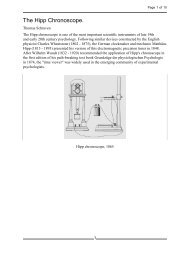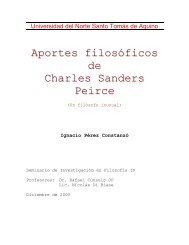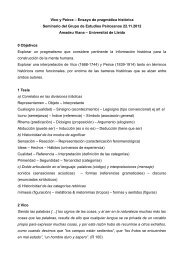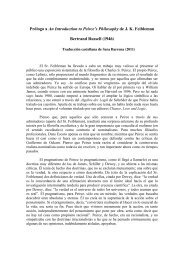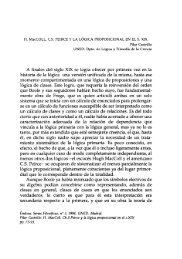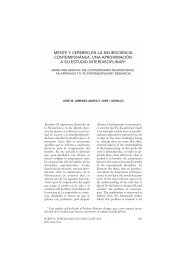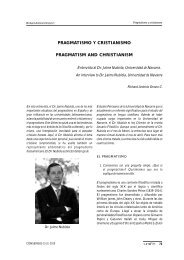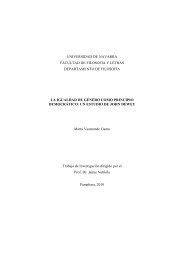Brucellosis 2003 proceedings - PHIDIAS
Brucellosis 2003 proceedings - PHIDIAS
Brucellosis 2003 proceedings - PHIDIAS
You also want an ePaper? Increase the reach of your titles
YUMPU automatically turns print PDFs into web optimized ePapers that Google loves.
Short Oral Communications<br />
Vaccines<br />
dominated immune response in goats, as determined by immunoglobulin G isotype<br />
analysis.<br />
VO3- IMMUNE RESPONSE IN CALVES VACCINATED WITH DNA VECTOR<br />
ENCODING Cu/Zn SOD PROTEIN OF Brucella abortus.<br />
A. Oñate 1 , I. Guzmán 1 , A. González 1 , S. Céspedes 1 , C. Muñoz 1 , R. Rivers 1 , H. Folch 2 , and E.<br />
Andrews 1 . (1) Laboratorio de Inmunología Molecular, Departamento de Microbiología, Facultad de<br />
Ciencias Biológicas. Universidad de Concepción. Concepción, Chile. (2) Instituto de Inmunología.<br />
Universidad Austral de Chile. Chile.<br />
Brucella abortus is an intracellular facultative bacterium, able to proliferate in<br />
the host phagocytic cells, which allows it to avoid extra cellular defence’s<br />
mechanisms and remain as a chronic form. In Chile bovine cattle is currently being<br />
vaccinated with B. abortus RB51 and it has a variable efficacy that does not assure a<br />
total protection. DNA vaccines are a powerful method of immunization, that has<br />
proved to elicit both humoral and cellular immune response. At the moment, new<br />
vaccination alternatives have been developed, the so-called DNA vaccines. This<br />
study was conducted to evaluate in calves the immunogenicity of a DNA vaccine<br />
encoding Brucella abortus Cu/Zn superoxide dismutase (SOD), a vector of known<br />
immunogenic capacity in mice (accepted Infection and Immunity 71: <strong>2003</strong>). Cattle<br />
were immunized with expression plasmids in eukaryote cells (pcDNA3.1), either<br />
bearing or not bearing the insert for SOD protein gene (sodC). As a positive control,<br />
calves were vaccinated with Brucella RB51. Intramuscular (i.m.) immunization with<br />
pcDNA-SOD induced lymphocyte proliferation against SOD recombinant protein and<br />
bacterial in similar form to animals immunized with RB51. Also, prevalence of<br />
antigenic specific ?d T cells proliferation was observed with pcDNA/SOD vaccine. All<br />
experimental heifers groups (vaccinated with pcDNA/SOD and bacterial) developed<br />
low level of serum antibodies. Our results suggest that this newly made plasmid from<br />
pcDNA-SOD is effective in inducing an immune response against brucellosis in<br />
cattle.<br />
This work was supported by grant FONDECYT 1010851, Chile.<br />
VO4- EVALUATION OF Brucella abortus S19 VACCINE STRAINS USED IN INDIA<br />
BY BACTERIOLOGICAL AND MOLECULAR TESTS AND VIRULENCE STUDIES<br />
IN BALB/c MICE.<br />
Falguni Mukherjee 1 , Jainendra Jain 1 , María Jesús Grilló 2 , José María Blasco 2 , Mrinalini Nair 3 . (1)<br />
Research and Development, National Dairy Development Board, Anand 388 001, Gujarat, India. (2)<br />
Unidad de Sanidad Animal, Servicio de Investigación Agroalimentaria, Gobierno de Aragón, Apartado<br />
727, Zaragoza, Spain. (3) Biotechnology Program, Department of Microbiology and Biotechnology<br />
Centre, MS University, Baroda 390 002, Gujarat, India.<br />
Two Brucella abortus S19 commercial vaccine strains used for vaccination<br />
campaigns against bovine brucellosis in India and two S19 strains used as a internal<br />
reference, were studied by both microbiologic and molecular assays, and tested for<br />
virulence in BALB/c mice. The four strains tested were identified as B. abortus biovar<br />
1 and all had the characteristics of strain S19, according sensitivity to penicillin and i -<br />
<strong>Brucellosis</strong> <strong>2003</strong> International Research Conference<br />
77


